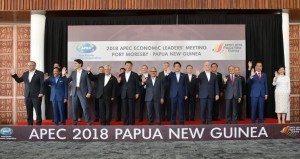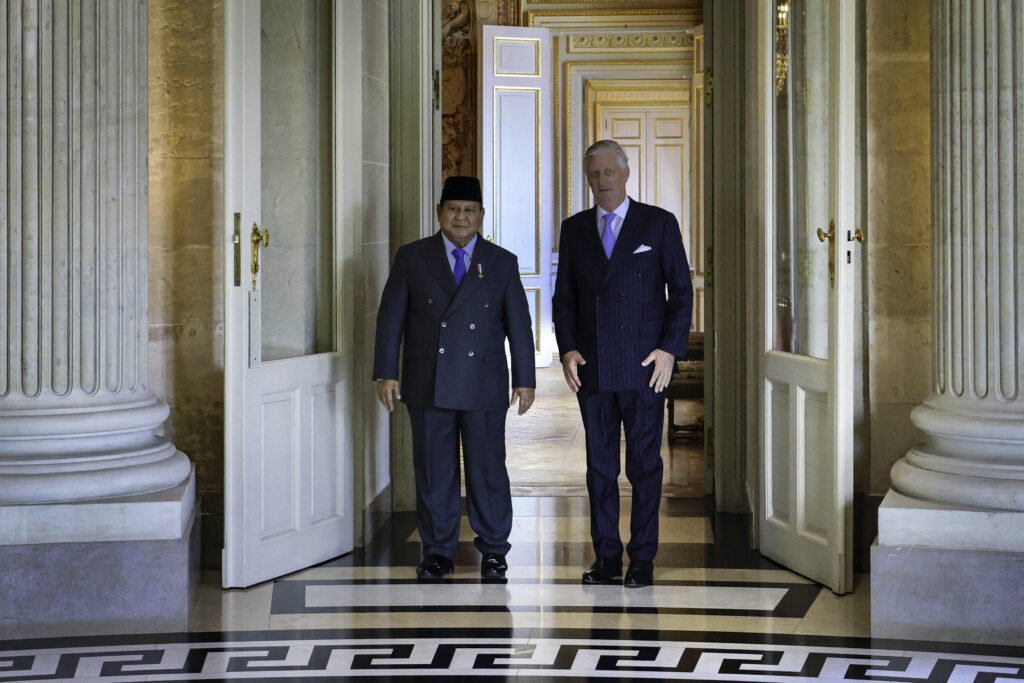Indonesia to Continue Implementing e-Commerce Policy Roadmap

President Jokowi takes photo with APEC leaders during APEC Meeting, in Papua New Guinea, Saturday (17/11). (Photo: BPMI)
Inclusive economic development using digital platforms has one of the priorities of the Indonesian Governments priority since 2014 and the country is predicted to be the largest digital economy in Southeast Asia by 2020, according to President Joko Jokowi Widodo.
The President made the statement during the APEC Business Advisory Council (ABAC) Dialogue with Leaders Meeting themed Inclusion in the Age of Disruption: Charting a Common Future held on Saturday (11/17) on the sidelines of 2018 APEC Summit.
President Jokowi added that Indonesia in 2017 has 132.7 million internet users and 92 million smart phone users and with this extraordinary number, the Government must continue the construction of digital infrastructure, such as national fiber optic network Palapa Ring and frequency spectrum arrangement, to provide affordable digital access for the community. In addition, Indonesia will continue to implement the E-Commerce Policy Roadmap to support e-commerce development by 17 percent and produce 1000 technopreneurs in 2020, he said.
President Jokowi went on to say that the Indonesian Government has also given great attention to the younger generation for Industrial Revolution 4.0 through vocational education, polytechnics and vocational training centers. Therefore, he added, the Government supports technology use in all sectors, for example Ruangguru application in the education sector, or ride-hailing and logistics service GoJek in the transportation sector.
This is to encourage an inclusive economy, said President Jokowi.
However, to ensure inclusive development in the digital era, President Jokowi stressed that digital inequality must be overcome through several efforts, including developing the Internet of things roadmap, providing a digital marketing platform for MSMEs such as Tokopedia and Qlapa, maintaining collaboration between people in disadvantaged regions with marketplaces in developing e-commerce platforms based on regional potentials, such as agriculture and fisheries, as well as improving school curriculum to better prepare the students in embracing the digital era.
In this digital era, we should prioritize inclusiveness because without it community gap becomes worse and may create social problems and even conflicts, President Jokowi added.
At the end of the dialog, President Jokowi explicitly warned that tensions between major countries in world trade could hurt the people. This can lead to social conflict, President Jokowi concluded.
The ABAC Dialogue with Leaders Meeting, which mainly discussed the issues trade, global economy and digital economy, was also attended by Prime Minister of Australia Scott Morrison, Prime Minister of Vietnam Nguy?n Xuân Phúc, Special Envoy of Taipei Chinese Morris Chang, as well as ABAC representatives from four countries, including Indonesia, and Chair of ABAC Indonesia, Anindya Bakrie. The dialog was moderated by Richard Cantor from the United States. (BPMI/EN)
Translated by: Estu Widyamurti
Edited by: Muhammad Ersan Pamungkas








